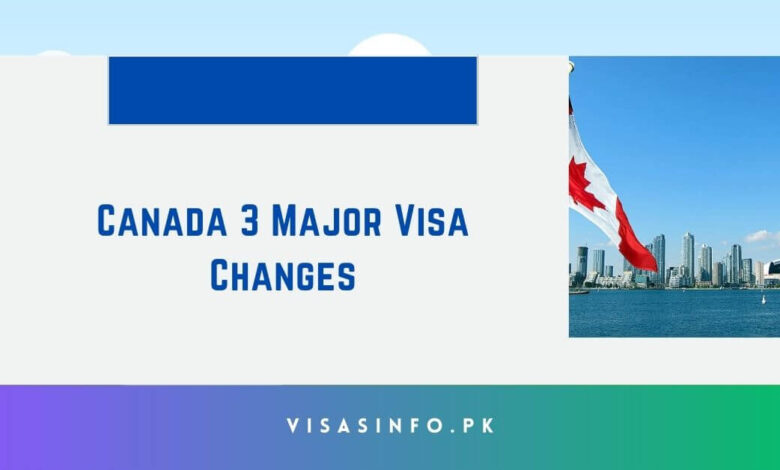Canada 3 Major Visa Changes 2024 – Check Here

The IRCC’s comprehensive immigration plan for 2024–2026 serves as evidence that Canada’s perspective on immigration is evolving. This post will discuss the new immigration strategy for Canada in 2024, the five-year PGWP, the conversion of transient residents to permanent residents, and other significant changes.
The new immigration plan that Canada has introduced reintroduces temporary residents to permanent residence (PR) and contains a five-year PGWP. Mark Miller, the minister of immigration in Canada, recently disclosed a significant development concerning the nation’s new immigration regulations. This article will examine three significant developments that will have an impact on immigrants in 2024.
Standardized Visa Processing Time
The initial substantial amendment to Canada’s immigration laws is the establishment of a consistent visa processing duration. Candidates were previously provided with an anticipated processing time when they applied for a visa to Canada, regardless of whether it was for a work permit, study permit, or tourist visa.
The time frame allotted for the processing of your application was intended to provide a general indication of the anticipated response time. Canada is presently planning to reduce and expedite these processing times through the implementation of the new strategy.
Additionally, the Canadian government aspires to enhance the predictability and efficacy of this. The modification should be communicated to all individuals who are applying for a Canadian visa, as it ensures that their applications are processed promptly. For instance, work permits are now issued within one month of application, as opposed to the two or three months that were previously required for processing.
Immigration Plan for the Next 3 Years
Canada’s immigration strategy for the subsequent years is another noteworthy declaration. The strategy delineates the nation’s immigration objectives, to attract a substantial number of immigrants over the next three years. Canada intends to admit 500,000 immigrants in 2025 and 2026, as it anticipates a greater than 485,000 influx of immigrants in 2024.
Canada is contemplating the possibility of reintroducing the temporary resident to permanent resident immigration pathway but with even more ambitious objectives. To achieve these objectives, the TR to PR program, which has been highly successful, enables transient residents to transition into permanent residents. This suggests that this initiative, which is a component of the nation’s immigration policy, may receive increased attention over the next three years.
Extended Post-Graduate Work Permit (PGWP)
A critical step has been taken with the much-anticipated and well-received expansion of the postgraduate work visa to a maximum of five years. Currently, the duration of your PGWP and the term of your study program are directly correlated. For example, upon completion of a one-year course, an individual would be granted a one-year work visa. In the same vein, if you complete a two-year degree, your work visa will be valid for three years.
A petition to extend the PGWP’s operational hours is presently in circulation and has garnered the backing of numerous Canadians. The two-year PGWP will be extended for the duration of the student’s study program after the completion of the abbreviated one-year program.
Minister Mark Miller responded to the petition by stating that the government is currently considering the concept with great care. This consideration is likely to generate a pool of suitable employment opportunities. If your academic pursuits are in a discipline that is relevant to these positions, you may be eligible for a PGWP that is valid for a maximum of five years. This modification is intended to better serve Canada’s labor market and address labor shortages in specific industries.
The objective of the most recent amendments to Canada’s immigration laws is to facilitate the application process and issue work permits to international students. The nation will also be able to welcome an even greater number of immigrants. As a prospective immigrant or student, you must be cognizant of these modifications to plan your travel to Canada.
This appears to be an opportune moment for individuals who wish to relocate to Canada, and the nation is demonstrating its dedication to inclusivity and diversity.
Canada Latest Visa Stamping & Processing Time
This article contains the most recent information regarding the processing and stamping timeframes of visas in Canada. Navigating the intricacies of January intake, particularly concerning visa stamping and processing timelines, may be a source of concern for students.
In this comprehensive guide, we will investigate the intricacies of Visa stamping and processing timelines, offering a perspective on both official and real-world scenarios. Additionally, we will address the most recent modifications to the IRCC’s diplomatic hierarchy and their potential impact on the sequence in which various types of visa applications are prioritized.
Check Also: Canada PR – 6 Achievements Possible Visitor Visa
Official Processing Time – IRCC
According to their regulations, the processing period for study visas is 10 weeks. This is in contrast to the initial communication of 8 weeks, which was followed by a subsequent revision that extended the schedule by 2 weeks. On the other hand, employment permits in Western nations are still processed within 29 days, which includes a 48-day supervisory period. These timelines have been publicly established by the IRCC and can be used as a reference by applicants.
When it comes to student visas in Canada, it is particularly crucial to bridge the divide between official dates and real-world experiences. The website’s 10-week window is a significant deviation from the actual processing schedule of 15 to 30 days for study visas. In a mere 15 days, a handful of fortunate candidates were granted study certificates.
Even in the presence of internal conflicts and modifications, this real-time processing speed remains constant. The time required to process the preponderance of study visa applications is less than one month, which implies that the IRCC’s internal disputes and modifications have not affected the processing time.
The most recent data indicates that the greatest processing period was 30 days, while a few fortunate individuals were able to obtain their visas in as little as 24 days. This uniformity, in conjunction with the processing time, contributes to a system that is both effective and dependable.
Benefits of Canada 3 Major Visa Changes
- Streamlined Application Processes: The time and complexity of applications are reduced by simplified procedures for a variety of visas and permits, which helps individuals relocate to Canada.
- Enhanced Pathways to Permanent Residency: The implementation of modifications to programs such as Express Entry and Provincial Nominee Programs (PNPs) has resulted in the provision of additional opportunities for skilled workers and their families to obtain permanent residency.
- Enhanced Visa Caps: Certain programs have increased their quotas, enabling a greater number of applicants to take advantage of Canadian immigration policies.
- Enhanced Support for International Students: The attractiveness of studying in Canada is further enhanced by the addition of additional opportunities for education and employment, which are provided by updates in study permits and work rights in Canada.
- Emphasis on Regional Development: Incentives for immigrants to establish themselves in rural and smaller towns are frequently incorporated into new policies, which aid in the stabilization of regional economies and the regulation of population development.
- Increased Work Permit Flexibility: The modification of work permit regulations has resulted in increased flexibility for both employers and employees, which has facilitated more diverse employment opportunities and simpler transitions.
- Family Reunification Policies: The Canadian government has implemented improved provisions for family sponsorship, which facilitate the immigration of family members to Canada and enhance family unity.
- Improved Assistance for Refugees and Asylum Seekers: The country’s refugee and asylum policies have been enhanced to provide enhanced support and protection to individuals who are seeking refuge in Canada.
Open Work Permit
The situation with open work permits may differ, although study visas are granted promptly. In the past, open work permits were issued in as little as one month; however, the process can now take up to two months. This change could be the result of policy changes, such as the prioritization of study visas or other operational issues with the IRCC.
Nevertheless, it is imperative to be aware of this modification when applying for an open work permit. One noteworthy trend to consider is the recent reduction in staff at the IRCC. The IRCC has reduced its workforce to 22 employees, with some of them located in the Philippines and others in Canada, as previously mentioned. This poses the possibility of the potential impact of these modifications on the prioritization of visa applications.
The IRCC’s primary focus remains on study visas in anticipation of the January intake, which underscores the significance of students commencing their academic activities. Consequently, study visas will probably continue to be prioritized in the months ahead. Applicants may anticipate a shorter processing time when comparing the availability of work permits or tourist visas to the offers for the January intake.
Visa Stamping
However, the act of stamping a visa is a distinct matter. The process of stamping visas required seven to ten days before the conflict and the personnel reduction. Some individuals were fortunate enough to receive their stamped visas within a week; however, the processing period for visa stamping has increased to 15 to 20 days in the post-dispute scenario, and in certain cases, it may take even longer.
This is primarily because there are fewer employees available to assist with the stamping process. The speed of visa stamping is directly influenced by the availability of staff, as the process necessitates physical presence. Delays in the visa stamping process have been a logical consequence of the IRCC personnel reduction. In this regard, applicants should be aware of potential delays that could affect their travel arrangements.
Conclusion
In conclusion, the processing times for open work permits have increased, whereas the processing times for study visas have remained consistent and efficient. The IRCC’s personnel reduction may also lead to delays in visa stamping. Nevertheless, it is imperative to maintain a balance of patience and knowledge throughout the application process, particularly during the open period in January.
If you have successfully submitted an application for a student visa and are presently anticipating the January intake, you can anticipate that your application will be prioritized. Nevertheless, there is a potential for the Visa certification process to be postponed. It is advisable to monitor your application and stay informed of any updates that may impact your trip schedule.
Despite these obstacles, it is improbable that the processing times will deviate significantly from the 30-day window, thereby guaranteeing a relatively straightforward application process.
Frequently Asked Questions:
-
Does Canada no longer process K-3 visas?
Canada no longer processes K-3 visas. Please select one of the following lists to find more specific information on the processing of fiancé visas in Canada and visit our information center: Follow the list below for a step-by-step guide to the fiancé visa process in Canada.
-
What are the new updates about student visas in Canada?
International students in Canada will no longer be able to change their college or university after arriving in the country without reapplying for a study permit. This change guarantees the student’s continued enrollment in the original visa-granting institution.
-
Can I get a Canada visa after 3 refusals?
Can I get a Canada visa after refusal? Unless your decision letter specifically states otherwise, you can reapply at any time if your application to enter Canada is denied. However, you should only reapply if you have new information to offer that you could not provide the first time.



